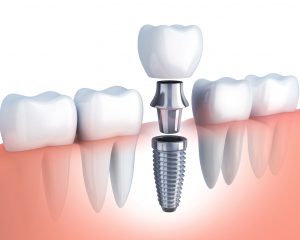 A dental implant is the most successful method of replacing a lost tooth because it’s unlike any other prosthetic. It’s the only technique to replace both the root and the crown of a tooth. Dental implants have over a 95% success rate and are proven to last for decades with the correct care. Although it’s rare, a dental implant can fail. Whether complications occur shortly after your placement surgery or several years down the road, your dental implant may need to be removed.
A dental implant is the most successful method of replacing a lost tooth because it’s unlike any other prosthetic. It’s the only technique to replace both the root and the crown of a tooth. Dental implants have over a 95% success rate and are proven to last for decades with the correct care. Although it’s rare, a dental implant can fail. Whether complications occur shortly after your placement surgery or several years down the road, your dental implant may need to be removed.
How Do Dental Implants Work?
Traditional tooth replacement methods only treat the portions above the gum line. Dental implants go a step further. A titanium post is surgically placed into your jaw to act as a new root. Your bone must fuse to it through a process called osseointegration for the procedure to be successful. After your bone has integrated with the post, an abutment is connected to it to attach your custom restoration.
Reasons Why Dental Implants Fail
Dental implants provide predictable results because the risk of complications is less than 5%. If a problem arises, it can occur within a few weeks of placing the implant. Common causes of early dental implant failure include:
- Infection
- Micro-movements of the implant
- Poor implant placement or positioning
- Insufficient bone support
- Allergic reaction
- Improper aftercare
- Immediate loading
Dental implant failure can even occur decades down the road. Late-term complications can result from:
- Peri-implantitis
- Nerve or tissue damage
- Rejection
- Injury
- Bruxism
Signs of Dental Implant Failure
The signs of failure can be subtle. It’s best to watch for any symptoms because quick care can prevent your dental implant from needing to be removed, like:
- Gum inflammation or pain near the implant
- Gum recession
- Bleeding around the implant
- Pain or discomfort when putting pressure on the implant
- Loosening of the implant
Removing a Dental Implant
If your dental implant can’t be saved, you’ll need to have it removed. It can be replaced after the underlying issue has been resolved, like an infection or bone loss. It can take 6-8 months for your mouth to heal before your dentist can place a new implant.
Ensure Dental Implant Success
Once your new implant is in place, you can ensure it lasts for a lifetime by following your dentist’s aftercare instructions, like eating soft foods and keeping your mouth clean. After your mouth has healed, you can avoid any complications by brushing at least twice daily and flossing every night. Avoid any habits that can damage your implant, like smoking or chewing on ice. Don’t forget to visit your dentist every 6 months for a cleaning and checkup.
About Dr. Ali Fulreader
Dr. Fulreader achieved her dental degree at the University of Maryland. She is a lifelong learner and has regularly continued her training in many advanced services, including dental implants. Dr. Fulreader is affiliated with many professional organizations, including the American Dental Association. If you have signs of dental implant failure, request an appointment through our website or call (847) 908-5566.
